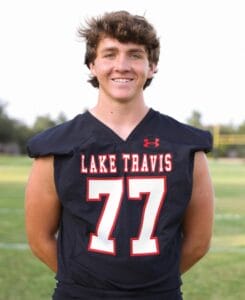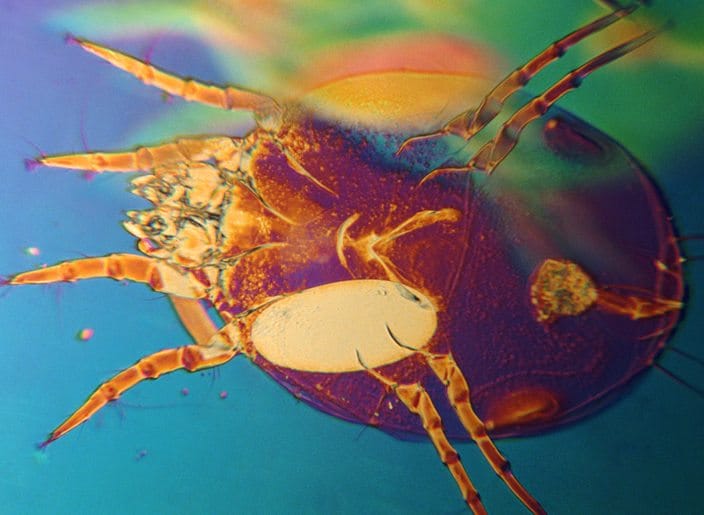
Updated: March 4, 2024. The peanut allergy incident that targeted high school football player Carter Mannon is not classified as bullying, his Texas school district has decided.
Carter’s family is frustrated and upset by the decision. “I am obviously disappointed. I don’t know what else to call it,” says Carter’s mom Shawna Mannon.
The Lake Travis Independent School District (LTISD) points to the definition of bullying under the Texas Education Code in its determination. Bullying is defined as “a single significant act or a pattern of acts” that meet various requirements outlined in the law. They include physical harm to a student, creating an “intimidating, threatening, or abusive educational environment for a student,” and disrupting the educational process.
“Upon concluding our investigation, it was determined that the legal elements of bullying were not met,” a district spokesperson told Allergic Living.
On Oct. 6, 2023, the sophomore opened his locker to get ready for a game with his Lake Travis varsity football team. His mother said when he picked up his cleats and jersey, peanuts fell out. Then he was shocked to see peanut kernels all over the locker. Carter broke out in hives from skin exposure to the kernels.
His mother says what particularly disturbed the teen and his family was that – just the day before – the two teammates behind the incident had asked questions like “could peanut kill you?” Carter, now 16, had replied that “it absolutely could kill me.”
The district initially decided no criminal charges were warranted. Now, the Austin-area LTSID has closed the book on bullying. Yet, Shawna Mannon still views the incident as “deliberate.”
After the family spoke out about the incident, Carter’s mom says he faced further harassment at school. The backlash included taunting and “let it go” comments.
Food Allergy Bullying Investigation
Eleanor Garrow-Holding, president and CEO of the food allergy nonprofit FAACT, finds the district’s handling of the allergy incident distressful.
“We are extremely concerned that the district has determined that this premeditated harassment of a student with life-threatening peanut allergy did not rise to the level of bullying, much less assault,” she says.
The teen, who plays offensive tackle, is not surprised about the Lake Travis district’s decision, his mom says. “This has been a consistently disappointing process for him.” She adds that there is a sentiment that her son doesn’t look like someone who is bullied “because he’s a big guy.”
“Just because someone does not ‘look bullied’ it doesn’t mean they aren’t. The mental toll this has on a person can be far worse than the physical,” she says.
Immediately after the locker incident, the district consulted with the assistant district attorney’s office and the county attorney’s office in an investigation to review potential criminal charges, the district spokesperson says. He tells Allergic Living that the Lake Travis ISD Police Department determined criminal charges were not warranted.
Bullying was not a part of the district’s initial investigation of the peanut incident, says the spokesperson. But it became a focus in November 2023.
At a November 15 school board meeting, Carter’s mom and several other parents spoke about the football allergy incident and the light discipline that followed.
The spokesperson adds that the Texas Education Agency determined that the district “addressed all concerns with regard to potential bullying and food allergy compliance.” It found “no violations of law or policy.”
Carter’s Family Seeks New Start, Justice
Carter’s family has since decided that a new school is the best option for their son. On February 27, 2024, he started at a high school in a different school district.
“Carter has been welcomed by his new school with open arms. It has been a refreshing transition so far,” Shawna Mannon tells Allergic Living.
The Mannon family will move to a new home over the summer. His younger sister will then join him in the new district at the start of next school year. His older sister will graduate from Lake Travis High in May.
“We feel like a fresh start for our family is going to be a big step in healing from this situation,” Carter’s mom says.
Mannon says the two Lake Travis High football players who targeted Carter sat out two games and were removed from the varsity locker room for the season. The family filed a grievance with the school, which included seeking stronger discipline.
The district spokesperson says that “the district cannot discuss or disclose matters pertaining to student discipline.” The Mannons’ grievance called for additional punishment to deter further actions, such as retaliation.
“The discipline clearly was not effective,” Mannon says. Since the incident, Carter found a peanut butter granola bar in his backpack, and also dealt with taunting and snarky comments, she adds.
The family’s next step is seeking justice for Carter on the federal level. The Mannons have filed a complaint with the U.S. Department of Education’s Office for Civil Rights (OCR). FAACT’s Garrow-Holding says her organization hopes “the Office for Civil Rights recognizes this harassment for what it truly is – disability discrimination.”
Mom’s Quest for Allergy Education, Law
Mannon hopes that speaking up about her son’s situation results in better awareness and education about food allergies. In response to the grievance, Lake Travis High made a start at honoring the family’s request to provide more education about food allergies to students. A first step was showing a video about the serious condition.
Carter’s mom hopes this is only the start. In an effort to foster change, Mannon plans to work with the food allergy nonprofit FARE and lobbyists.
She wants to see the school district work with FARE and its educational resources. As well, Mannon hopes to help work toward establishing specific laws in Texas to support people with food allergies. In particular, she would like to see legislation that makes it criminal to use a person’s allergen as a means of attack or harm.
Dr. Sung Poblete, FARE’s CEO, agrees that education about food allergies is vital. “If it were well understood that food allergy is a disease, this incident might never have happened,” she says. Students should be taught “to treat those living with this disease with the same consideration and respect that they would for an individual living with any other serious illness.”
She says this hurtful incident is “an opportunity for the community to come together, rally around this family, and be an example for other communities so that incidents like this stop happening.”
Focus on Change – and Football
Carter’s family appreciates the support they have received, which includes thousands of comments online from people all over the world. But they’ve also seen many negative comments that call out the perpetrators. Mannon isn’t on board with that.
“We do not condone verbal attacks on minors,” Carter’s mom says. “We are trying to keep our focus positive and hoping to make a change for people with food allergies.”
As for Carter, he is focusing on playing spring football. He has high hopes for next season, his mom says.
“He would love to be able to enjoy playing football without the distractions and the worries he had this past season. It was unfortunate that his first year on varsity was so tainted by this situation,” she says.
Related Reading:
Teammates Put Peanuts in Allergic Player’s Locker: Mom Speaks Out
Food Allergy Bullying: How to Spot It and Actions to Take
Food Allergy Bullying Resources from FAACT





